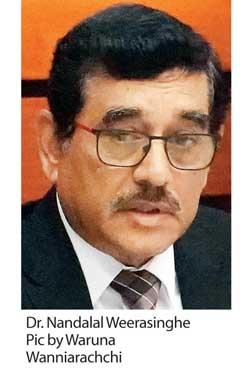19 Aug 2022 - {{hitsCtrl.values.hits}}
By Nishel Fernando
The Central Bank (CB) is optimistic of wrapping up the much-anticipated staff-level agreement with the International Monetary Fund (IMF) for a bailout package during the upcoming staff team visit scheduled for end of this month.
 “An IMF mission is planning to visit Sri Lanka towards the end of this month with the intention of reaching the staff-level agreement on the policy package. Once we reach the staff-level agreement for the programme, we will have to start approaching our external creditors on debt restructuring along with our advisors,” CB Governor Dr. Nandalal Weerasinghe said.
“An IMF mission is planning to visit Sri Lanka towards the end of this month with the intention of reaching the staff-level agreement on the policy package. Once we reach the staff-level agreement for the programme, we will have to start approaching our external creditors on debt restructuring along with our advisors,” CB Governor Dr. Nandalal Weerasinghe said.
He was speaking at the post monetary policy press briefing held at CB premises yesterday.
Addressing the growing fears of a possible restructuring of domestic debt fueled by President Ranil Wickremesinghe’s recent remarks, Dr. Weerasinghe stressed that the government’s stance remains unchanged on limiting the debt restructuring process to external debt as there’s no requirement to restructure domestic debt.
“In my view, what the President said was that financial advisors Lazard is looking at different scenarios towards achieving debt sustainability over a period of ten years. However, the government’s position still remains limited to restructuring external debt,” he said.
However, he acknowledged that foreign creditors, in particular ISB holders, may question the treatment on domestic debt when the government approaches them. He cautioned that restructuring of domestic debt is detrimental to the banking sector and could weigh on economic recovery.
“Our position is that if we were to restructure domestic debt, that will have serious implications on the financial sector including the banking sector.
That will not help external creditors to recover whatever the relief that they are going to grant us. We will face recapitalisation of banks and numerous issues and that will not help economic recovery in the medium term. We want to minimise the impact on the domestic banking system in order to maintain the financial sector stability, so the economy can recover faster and external parties recover their liabilities sooner,”he elaborated.
Meanwhile, the CB expects the headline inflation to peak to around 65 percent or below that level in September.
“Inflation is likely to peak somewhere in September and then it will be trending down. The latest projection is adjusted downwards when compared to our previous projections. There will still be a gradual increase because we have to factor in the increase in electricity prices. Earlier, we projected the inflation to peak to 70 percent, but we expect the headline inflation to peak to 65 percent or below that level,” he said.
Amid faster than anticipated easing of headline inflation coupled with the marked slowdown in private sector credit growth, the Monetary Board at its meeting held on Wednesday decided to maintain the Standing Deposit Facility Rate (SDFR) and the Standing Lending Facility Rate (SLFR) of the Central Bank at their current levels of 14.50 percent and 15.50 percent, respectively.
However, Dr. Weerasinghe outlined that the CB would mainly focus on curtailing the inflation despite high interest rates, which have hit the private sector credit growth. He emphasised that restoring price stability is critical for economic recovery despite high interest rates-led increased finance cost for businesses.
“The high inflation is the main reason for high cost of production. That’s why we need to maintain the tight monetary policy to contain the inflation. Once inflation comes down, we can expect an improvement in the operating environment,” he added.
23 Nov 2024 7 hours ago
23 Nov 2024 7 hours ago
23 Nov 2024 9 hours ago
23 Nov 2024 23 Nov 2024
23 Nov 2024 23 Nov 2024